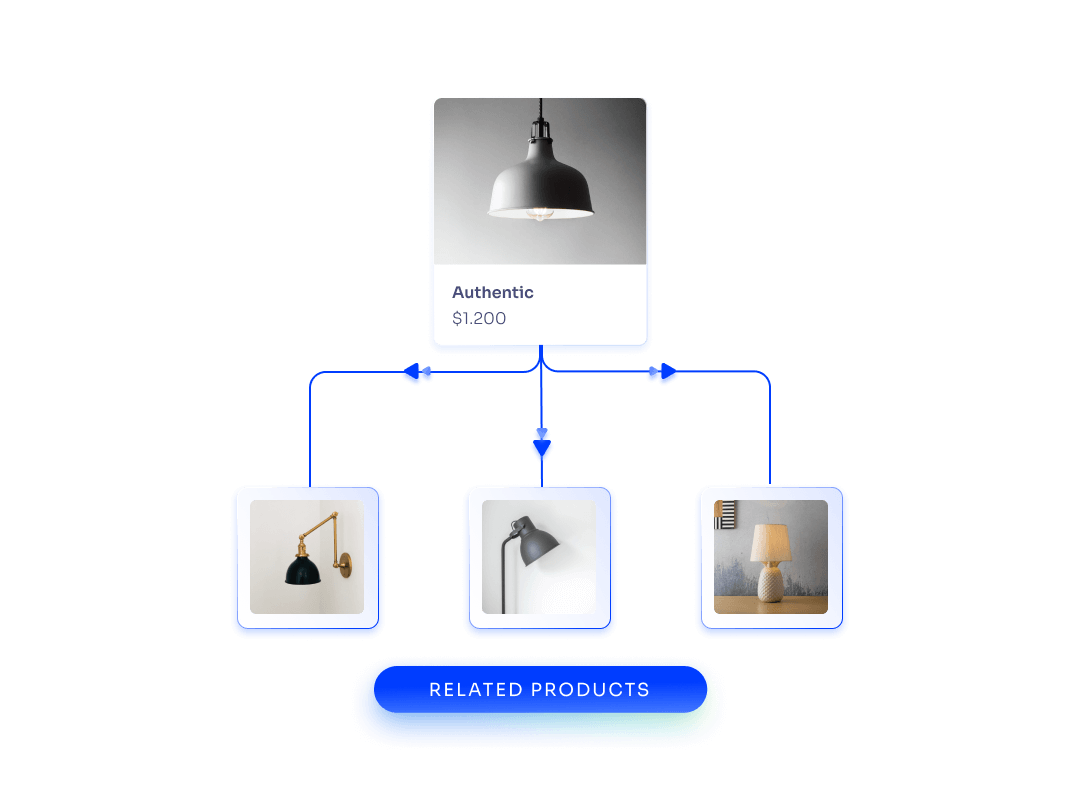
Recommendations Simulator
Ensure your algorithm is providing the most accurate recommendations before going live.
Use customer data to optimize user experience.
Flexible, hosted recommendation API with advanced programmatic control.

With Algolia Recommend, developers can rely on our robust APIs to build the recommendations experiences best suited to meet their companies’ needs. Build recommendations carousels quickly that automatically show products or digital content to users, subscribers, and shoppers, while leveraging the power of AI.

Maximize conversions and catalog exposure by displaying similar products and other relevant content.
Leverage user behavior and collaborative filtering to drive cross-selling, upselling, and increase average order value.
Increase time spent on time and user engagement with “Because you’ve watched” or “More on this” recommendations.
Show up what are currently the most popular products and engage your visitors from the first second with truly dynamic home page.
Contextualize and merchandize your recommendations.

Understand your users, uncover hidden opportunities, and optimize your overall customer experience.

Ensure your algorithm is providing the most accurate recommendations before going live.
Use customer data to optimize user experience.

A filtering method that allows you to surface the perfect recommendations for your business.

Give your business users the autonomy to apply their strategies on top of recommendations.

Curate, automate and personalize in a no code environment.

Index content from any source.

Start in minutes, leverage Algolia’s full capabilities.

Focus on building, Algolia ensures performance and reliability at scale.

Keep your users and your customer data safe.

Create a new carousel using as little as 6 lines of code.

Increase in order rate

Increase in Average Order Value

Online revenue





“We knew that Algolia was a really big investment for us but, for us, the quality was the most important thing, and Algolia is the best — one of the best — solutions. So, we adopted it and I really love it.”
Piotr Tuszewicki
Co-Founder @ Noski Noski
“We don't have to do very much with Algolia Recommend. With our previous solutions, there was so much manual configuration, and there were an awful lot of times when it required constant upkeep when making changes. With Algolia we don't need to do half of the things we previously did.”
Ben Pusey
former Software Product Owner @ Gymshark“Not only Algolia pay for itself by enabling us to offer visibility to our CPGs, it also makes it easier for us to promote our higher-margin private label brands and include personalized impulse products on checkout.”
Felipe Alonso Valverde
Head of ecommerce @ Auto MercadoExtensive set of APIs with advanced front-end libraries
Developer kickstarter with code samples, implementation guides, and docs
No-code dashboard and visualization for business users
End-to-end applications of AI & ML with models trained on billions of data points
Real-time engagement data to personalize each experience
Business flexibility to fine-tune results
1.5+ trillion queries powered annually with <20 millisecond response time per query
99.999% availability with 100% API uptime guarantee

B2C ecommerce
B2B ecommerce
Marketplaces
Media
SaaS
and more...

Mobile and app search
Headless ecommerce
Voice search
Image search
Enterprise search
Really fast. Most recommendation requests will take from 1 to 20 milliseconds to process.
Under the hood recommendations rely on supervised machine learning models and the Algolia foundation.
For both models, the data corresponding to the past 30 days is collected. This results in a matrix where columns are userTokens and rows are objectIDs. Each cell represents the number of interactions (click and/or conversions) between a userToken and an objectID. Then, Algolia Recommend applies a collaborative filtering algorithm: for each item, it finds other items that share similar buying patterns across customers. Items would be considered similar if the same users set interacted with them. Items would be considered bought together if the same set of users bought them.
Getting recommendations is a four-step process:
Our recommendation engine is language-agnostic: it supports alphabet-based and symbol-based languages (such as Chinese, Japanese or Korean).
Essentially a recommendation engine will analyse interactions of users with different items to draw links between those items. Deep dive here.
An example of a recommendation engine is a product recommendation engine for ecommerce. It will analyse what products shoppers buy together or what products shoppers interact with in a short amount of time, to generate “Frequently Bought Together” or “Related Products” recommendations. Learn more here!
The key components of a high-performance recommender system are: Data Sources, Feature Store, Machine Learning Models, Predictions & Actions, Results & Metrics. More details in this dedicated series.
The best way to improve a recommendation engine is to make sure you’re feeding it qualitative data: user interactions and items. Additionally there are filters that you can apply to the recommendations that are being generated. Ultimately, key performance indicators must be accurately tracked in order to identify areas of improvement.
The most obvious operational goal of using a personalized recommender system is to recommend items that are relevant to the user, as people are more likely to buy items they find attractive. Learn more about personalized recommendations and their benefits here!
Content-based recommendations are based solely on items’ descriptions. Personalized recommendations are also based on user’s interactions and each user will see a different set of recommendations, depending on their individual preferences. Learn more here!